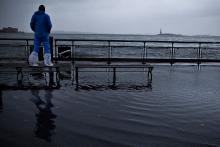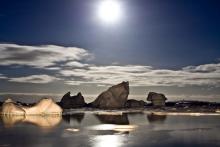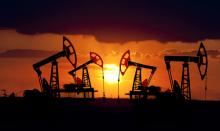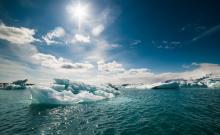Climate change
James Balog and Jeff Orlowski, makers of the documentary film 'Chasing Ice' sit down with the "Morning Joe" MSNBC crew to discuss the implications of climate change and arctic ice melt. Check our our Sojo review of the film.
Visit NBCNews.com for breaking news, world news, and news about the economy

Photographer James Balog has a story for you, and it might be one you haven’t heard before. Starting in 2005, he and a team of adventurous photographers set out to provide visual, undeniable evidence for climate change. What they found he described as “decrepit old men falling into the earth and dying:” glaciers worldwide disappearing at record rates.
The film Chasing Ice is the story of their Extreme Ice Survey as they place time-lapse cameras on glaciers in Greenland, Iceland, Montana, and Alaska, and watch as they disappear. The public does not want statistics, they say. The public is being misled to believe that scientists do not agree on climate change. The public is losing interest but needs to pay attention.
As Balog and his team will tell you, the memory cards in their cameras contain the memories of the landscape, a “limitless universe of forms,” that will never be seen again. Man-made climate change (as documented by ice cores from the very glaciers that may not exist in a few years) is fundamentally altering our geology.

It is not surprising that our purely secular “environmental” movements have played out their ability to change society. For the changes we need to undertake are not only technological and political, but deeper and more difficult. They call on us to shape new institutions and new values.
When God’s Wind shattered Pharaoh’s power at the Red Sea, it was only the beginning of the creation of a new society. It took 40 years of struggle, of transformation and mistake, backsliding and grumbling, to ready a people that could live in a sacred relationship with each other, with the Earth, and with the Breath of Life.
So even if we were to shatter the gross and domineering political and economic power of our modern pharaohs, the giant corporations of Big Oil, Big Coal, Big Unnatural Gas that will not relent from over-burning and overpowering us, we would still need to be growing what religions claim to offer: a new vision of our lives.

As the winds and the rain of Hurricane Sandy settle down, one bit of the aftermath is going to be another round of conversation about how climate change is affecting our world.
It’s not a conversation you have heard much of in the presidential campaign this year. Climate change is one of a quartet of issues that will have a huge impact on the future of this nation that have gotten short shrift by both President Barack Obama and Gov. Mitt Romney.
Poverty. Guns. . Drones. Climate change.
Bring up any of those issues and watch the candidates make a quick nod of concern and then scamper away from any specifics. Yet those issues will be with us long after Nov. 6, so it is incumbent on those of us in the faith community to be laying the groundwork now for how we will address them in the coming year.
That work has already begun, of course. The challenge is not to let the post-election exhaustion sweep away those concerns like they were potted palms on a pier in the midst of the hurricane.

Editor's Note: Sojourners offices, which are based in Washington, D.C., will be closed due to the weather. We pray for the safety of our staff, neighbors, and all those affected by this storm.
God, we pray for all those along the East Coast in the path of Hurricane Sandy. Grant safety to all, including the first responders. We pray for all those who will lose electricity and whose homes may be been damaged. But we pray especially for those who have no homes and no shelters in times such as these. We ask that your hand would protect them and keep them safe. May our paths cross with theirs so that we might have an opportunity to love and serve them. Amen.
"O Lord of LIght" by the Innocence Mission

It was game time. The Saturday night crowd on the Vermont campus was festive, boisterous, pumped. People cheered and whooped when told that one of their heroes, climate activist Tim DeChristopher — serving a two-year federal sentence for his civil disobedience opposing new oil and gas drilling in Utah — would soon be back on the field.
When the man on the stage, 350.org’s Bill McKibben, said it was time to march not just on Washington but on the headquarters of fossil fuel companies — “it’s time to march on Dallas” — and asked those to stand who’d be willing to join in the fight, seemingly every person filling the University of Vermont’s cavernous Ira Allen Chapel, some 800 souls, rose to their feet.
McKibben and 350, the folks who brought us the Keystone XL pipeline protests, are now calling for a nationwide divestment campaign aimed at fossil fuel companies’ bottom line. Beginning with student-led campaigns on college campuses, modeled on the anti-apartheid campaigns of the 1980s, they’ll pressure institutions to withdraw all investments from big oil and coal and gas. Their larger goal is to ignite a morally charged movement to strip the industry of its legitimacy.
“The fossil fuel industry has behaved so recklessly that they should lose their social license — their veneer of respectability,” McKibben tells his audience. “You want to take away our planet and our future? We’re going to take away your money and your good name.”

Last Friday I found out I would be traveling to New York for a Climate Action Prayer Rally at the second presidential debate. I barely slept all weekend, I was so excited. I’ve never been north of Washington, D.C., before, never seen cities like Philadelphia, Baltimore, or New York. But I wasn’t just excited to see these cities, I was excited because of the reason I was going to see these cities.
I accompanied our Creation Care Campaign Director, Alycia Ashburn, and our friends from Young Evangelicals for Climate Action (YECA) to Long Island, where we would make our presence known at the debate.
Creation care is something I feel very passionately about. As a person of faith I think it is my responsibility to protect this beautiful planet that God has given us. To advocate for creation care at such an important venue is truly an honor and privilege; as I joined my brothers and sisters in sending forth a ripple of hope in the water and offering a witness that is faithful and just.

God created the earth to produce every thing Adam and then Eve — and then their issue, and then all of us — would need. In the beginning, the garden needed little tending, but — due to a rather fortunate fall — eventually Adam and Eve, as his helpmate, and their children and the issue of generations had to toil the earth to pull from the garden those things God intended to meet their needs.
Along the way, progress was made in the form of extensions of the garden bounds, the distribution of water and other nutrients, applications of healthful foods and herbs, techniques for every aspect of garden production. A community grew from a couple who worked hard as stewards, first out of penance and then, I think, out of love for the land provided to sustain them and for each other as they worked together. This is the story of how sustainability came to be.
To simplify: God created the Heavens and Earth. He designed a glorious garden and put in it everything needed to make that garden productive: plants, water, clean air, soil, enrichers (bugs, worms, life, decay), animals, and the Sun, the first and last fuel. And, finally, He made man and woman.
What culture war? At a survey release of young evangelicals and proceeding panel discussion, common ground was the pervading theme.
While panelists ranged in religious and political backgrounds — representing groups like Young Evangelicals for Climate Action, World Relief, Family Research Council, USAID, World Vision, the Manhattan Declaration, and Feed the Children — there was an overarching agreement that while young evangelicals are largely pro-life, life issues now extend to beyond the typical to things like creation care and immigration.
“There is still a lot of tension that many young people feel in trying to identify with one political party or the other,” Adam Taylor, vice president of advocacy for World Vision. “… There is a real deep commitment to a pro-life agenda, but that agenda has now expanded and includes a core and strong commitment to addressing issues of poverty.”

I’ll be traveling to New York tomorrow with a number of Christian colleagues. We’re having a rally — a Climate Action Prayer Rally! And you can join us!
I’m not sure about you, but I’m incredibly disappointed that our nation’s leaders – from all sectors, all parties, and all levels – continually neglect to take leadership on our climate and energy crisis.
There are many reasons that climate change should be a top election issue, but here are just a handful of the most important ones.
New tracking software developed by Kevin Gurney, an ecologist at Arizona State University is intended to help cities across the country keep their word on climate. Many mayors have pledged to reduce their carbon footprint, but they have no objective way to measure progress. The software will allow them to identify and target areas of the city that are releasing the most carbon, in order to address the real problem areas.
The idea of a personal carbon footprint is not new, but software that can follow our dirty tailpipes down the street is certainly revolutionary. Could the uncomfortable feeling of being watched be the encouragement city residents need to change their habits?
"Gurney collects piles of information about a city's energy diet — from utilities, transportation departments and air-pollution monitors. When he analyzed Indianapolis, Gurney and colleagues from Purdue University and other institutions could pinpoint emissions down to the level of a building or a street."
It’s been a good week for getting real. After Tuesday’s revelation that the majority of Americans link increased natural disasters with climate change, a new report yesterday indicates that they may be right.
In their newly-published report, reinsurance company Munich Re claimed that global climate change has been driving natural disasters and extreme weather events, and that this trend will increase as the climate continues to change.
THE SKIES LOOK different to me these days. The soft and tranquil clouds of my youth that often reminded me of cute Disney characters—a misty Dumbo drifting languidly overhead—have mostly been replaced by dark and threatening formations, more reminiscent of Disney’s lesser-known films, such as Godzilla vs. The Little Mermaid: This Time It’s Personal. More specific, the violently roiling skies of late are like a scene from Steven Spielberg’s War of the Worlds, where intense storm clouds heralded an alien invasion.
Which is why I always carry a prepared speech of surrender in my backpack, in case I need to immediately declare loyalty to a superior race. Although, so far, the alien presence has been pretty unimpressive, consisting mainly of crude, humanoid Kardashians attempting to assimilate quietly. One hopes that when the next prototypes arrive, they will better conceal the vaguely reptilian features of their planet’s indigenous life forms. Not to mention vice presidential hopeful “Paul Ryan,” whose hairline displays the telltale widow’s peak once thought to be a unique facial characteristic of earthly vampires, until NASA rovers spotted it on a rock on Mars. (Mars reportedly privatized its health care for seniors decades ago, and just look at the place now: not an elderly person in sight.)
BUT WHAT WAS I talking about? Oh yes, the weather. The typical forecast this summer included phrases such as “hurricane-force winds,” “damaging hail,” and “start hoarding toilet paper.” Of the four mature trees in our yard, only one remains, having survived repeated gale-force winds through pluck and attitude, although having a trunk the circumference of a grain silo probably helped. (I could never get my arms around it for a hug, back when I used to do that sort of thing.)

“LOTS OF COMPANIES do rotten things in the course of their business—pay terrible wages, make people work in sweatshops—and we pressure them to change those practices,” says veteran anti-corporate-abuse leader Naomi Klein. “But these numbers make clear that with the fossil-fuel industry, wrecking the planet is their business model. It’s what they do.”
The numbers she’s referring to are straightforward—they were first put forth in a report by a group of U.K. financial analysts a year ago, and they’ve now begun to seep into the debate about climate change. They show that if we have any hope of keeping the increase in global temperature below the 2 degree Celsius line (a goal so conservative that even the U.S. and Chinese governments have embraced it as their target), we can only emit 565 more gigatons of carbon dioxide. But the fossil-fuel industry, it turns out, has 2,795 gigatons worth of carbon in its inventory—that is, five times what it would take to run the Genesis creation story backwards.
In other words, this is not a case of “bad business practices.” It’s not like Apple paying bad wages or making workers use dangerous chemicals. Those are deplorable, and correctable—they’re what the boycott or the shareholder resolution was invented for. That’s how we’ve fought everything from grape growers to sweatshops.

EVEN AS ELECTION-YEAR news cycles move on, the nation faces the aftermath of a prolonged and dramatic heat wave. July 2012 broke two records: It was the both the warmest July ever recorded and the warmest month—period—ever recorded in the lower 48 states. In our home of Chicago, temperatures crept past 100 five times. Moreover, the extreme drought of 2012 is not a random event, but part of a worrisome trend.
Global climate change has come to the heartland. Unless we take collective and decisive action, 102 could become the new 93. And it’s not just armpits and foreheads that will sweat. We have already glimpsed the future, and it is not pretty: massive forests burned in Colorado; major power outages; thousands of acres of crops lost to drought in Illinois, Indiana, Kansas, Missouri, Oklahoma, and elsewhere. These ominous events are indications of the “new normal” unless we make widespread changes in fossil-fuel consumption.
The farming crisis has been acutely severe—and it is directly related to climate change. This summer, the U.S. Department of Agriculture designated more than half of all U.S. counties as disaster areas (1,584 in 32 states). Fred Below, a crop biologist at the University of Illinois at Urbana-Champaign, bluntly summed up the reality: “It’s like farming in hell.”
Ironically, agriculture is the human activity that emits more greenhouse gases into the atmosphere than any other source, including transportation and industry. A key reason: Today’s agriculture intensively depends on burning fossil carbons. (Methane emission from cows and rice fields, and deforestation to clear farmland in the global South, are also contributors.) Being so dependent on fossil fuels means that the food sector is the greatest contributor to global climate change—and that rising oil costs increase food costs, squeezing the poor and marginalized.

The climate crisis is getting bad and we may be finally starting to notice. With increasingly crazy weather across America—scorching heat waves, massive fires, destructive derechos, devastating droughts—polls are starting to show a growing awareness of and concern for how our massive amounts of pollution are changing the weather and therefore changing our lives (mostly for the worse).
I know this is starting to sound alarmist and extreme. It should. Because reality is starting to get pretty desperate for those whose lives and livelihoods depend on a relatively stable and predictable climate. At the end of the day, that’s all of us. The first to get hit, however—and they are currently getting hit hard—are those who grow and raise our food (farmers, ranchers, fishermen, etc.), those who are economically and physically vulnerable (the elderly, sickly, homeless, etc.), and those who just happen to be in the wrong place at the wrong time (the victims of these storms and fires). And while we’re starting to feel the impact of climate change in the United States, our global neighbors in regions such as Africa have been the ones bearing the brunt of the suffering.
After decades of scientific studies and expert warnings, climate change is no longer something being debated; it is something being experienced. Let’s just hope we do what’s right to overcome this crisis before it is too late. Because “too late” may be coming a lot sooner than we realize, and “what’s right” may be a lot harder than we want to accept.

Because the scientific evidence surrounding climate change is clear, and the implications for humankind are many, the response to these global challenges needs to be persistent, organized, and significant. As Jesus calls upon humankind to “love thy neighbor," and as the Old Testament prophets remind us to strive for justice, we recognize that within a deeply connected world “neighbor” implies all that God has created, and injustice anywhere is injustice everywhere.
So an implication of Jesus’ words and actions is to share and receive the Good News not only on Sunday mornings, but through daily acts of long-term advocacy that promotes sustainable livelihoods. With COP18 in Qatar on the horizon, the time has come when humanity can no longer afford to fight over our resources, and the moment is upon us to prod our elected officials toward legally binding legislation that values the gifts of creation that God has entrusted us to manage.

The melting of sea ice during summer in the Arctic is part a natural cycle, but the rate at which the sea ice is currently melting is unprecedented, as illustrated in today’s BBC News.
"Norwegian researchers report that the sea ice is becoming significantly thinner and more vulnerable.
Last month, the annual thaw of the region's floating ice reached the lowest level since satellite monitoring began, more than 30 years ago.
It is thought the scale of the decline may even affect Europe's weather."
Across Sacred Fences
More than 50 contributors offer moving, insightful personal essays about interfaith experiences in My Neighbor’s Faith: Stories of Interreligious Encounter, Growth, and Transformation. Edited by Jennifer Howe Peace, Or N. Rose, and Gregory Mobley. Orbis Books
Women Rising
On Oct. 1 and 2, PBS will air the two-part special Half the Sky. Inspired by Nicholas Kristof and Sheryl WuDunn’s best-selling book of the same name, the film follows the authors through 10 countries to meet people challenging extreme gender inequality and the poverty, trafficking, and violence it perpetuates. pbs.org/independentlens

An examination of current public debate reveals a divide between the “brown agenda” of economic opportunity and the “green agenda” of environmental sustainability.
On the one hand, a “brown agenda” concerns economic opportunity, or in other words, the alleviation of poverty. In light of ongoing distress surrounding malnutrition, infant mortality, and unemployment, the brown agenda is important, urgent, and worthy of support. On the other hand, a “green agenda” relates to environmental sustainability and care for the Earth. As scientific reports affirm the reality of climate change, and in recognition of decreased access to clean water and biodiversity around the world, the green agenda is also deeply important, urgent, and worthy of support.
With the above thoughts in mind, one recognizes that both brown and green agendas are essential for the promotion of life. However, the proponents of each agenda seem to be at odds with the adherents of the other. For example, far too many with a “brown agenda” believe that the best way to reduce poverty is to reduce environmental controls, and to the contrary, those engaged with the “green agenda” too often place the needs of the Earth before the livelihoods of the poor and marginalized. As a result of this persistent struggle between “brown” and “green," progress on both agendas is limited, and our path toward economic opportunity and environmental sustainability is severely off course.